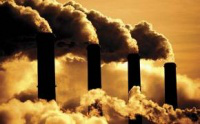Typhoon Haiyan is linked to Climate Change, say Columbans

Many industries pour greenhouse gasses into the atmosphere
Is the severity of Typhoon Haiyan linked to Climate Change? The Columban Missionary Society believes so, linked to its own experience in 16 countries and after listening to the vast majority of the world’s climate scientists who have predicted increasingly severe weather linked to a warming planet. The strength of tropical storms such as Haiyan is connected to sea temperatures, for as the oceans warm with climate change, there is extra energy in the system. Pacific ocean waters are warming faster than expected, and there is a broad scientific consensus that typhoons are now increasing in strength. All this is bad news for the Philippine archipelago of islands, which has just been hit by the strongest storm ever to hit land, and which may face another typhoon within days.
Since planetary warming is human-induced, due to human society putting greenhouse gases into the atmosphere - the Columbans feel it is untrue to call disasters such as the latest Philippines catastrophe ‘natural’.
Yeb Sano, Philippines lead negotiator at the current UN climate summit in Warsaw, agrees and today he called for urgent action on climate. “We must stop calling events like these as natural disasters” he said. “It is not natural when science already tells us that global warming will induce more intense storms” he added, “and it is not natural when the human species has already profoundly changed the climate”. He felt that action must be urgent and drastic “to ensure that we prevent a future where super typhoons are a way of life” and he deplored “international climate stalemate”. He felt the poorest people of the world are at greatest risk because of their vulnerability and decades of maldevelopment, “which I must assert is connected to the kind of pursuit of economic growth that dominates the world; the same kind of pursuit of so-called economic growth and unsustainable consumption that has altered the climate system”.
It is six years since Columban clergy, religious and laity involved in Justice, Peace and Ecology gathered in Manila in 2007 to examine global warming. It was apparent that the symptoms of climate change were being seen in all the countries where Columbans work, and there were particular concerns for the most vulnerable. Down the road from where the group met in Manila, in the Columban parish of Malate, cases of Dengue fever had been recorded for the first time, an illness previously unknown in the area. Health workers were also on the alert for malaria, not usually present in Manila, but likely to appear with warmer temperatures.
There was also concern that Malate is close to the sea and rising sea levels, caused by expansion of the ocean as it warms, would make the area increasingly prone to flooding from tidal surges and extreme weather. Thousands of poor families living in that neighbourhood would be vulnerable to sudden disaster.
During the same week in 2007, the Columban delegates joined local Filipinos attending a global warming conference organised by the Archdiocese of Manila, which became the first diocese in the Philippines to launch a programme of study and action to address climate change. More than 500 representatives of Catholic parishes and schools in the archdiocese attended.
One keynote speaker was Fr Sean McDonagh, the Irish Columban priest and eco-theologian who worked in the Philippines for several decades. “A one-metre rise in sea level in the Philippines will affect 64 out of the 81 provinces” he warned. “Already, the Philippines is coping with more frequent and severe typhoons, and farmers are having to deal with increasingly unstable climate patterns,” he added. Specific commitments, such as the setting up of an eco-desk in every parish in the Manila Archdiocese, were made during the final mass.
At the 2007 Columban conference, the Columbans undertook to address global warming by reviewing its energy use, doing carbon audits, and campaigning for carbon reduction. In a statement from Manila, its 25 Justice, Peace and Ecology workers said that “the endangered Earth demands a new prophetic way of being missionaries”. They felt the response to the “unprecedented crisis” of climate change “must be prophetic”, following the lead of Pope John Paul II who urged Catholics in 2001 to undergo an “ecological conversion”. Yet, even the Columbans have been shocked at the destruction of Typhoon Haiyan, which has flattened vast areas, killed at least 10,000 people and left nine million people struggling to survive without food, shelter or clean drinking water. Of course, the humanitarian aid response is vital, but the Columbans say the political will to address Climate Change must be there too. It is a moral imperative, particularly looking to the rights of the poor and the rights of generations yet unborn.
Columbans in the Philippines run several organic farms and tree planting programmes, focusing on the promotion of sustainable, low carbon agriculture and tree conservation which helps reduce atmospheric levels of carbon dioxide. They also push for climate action in the richer countries, including Britain, and that includes supporting the new ‘Towards fossil-free churches’ initiative of Operation Noah and the LiveSimply award which encourages parishes to live simply, sustainably and in solidarity with the poor. Columban JPIC in Britain recently supported the production of a new DVD ‘Conflict and Climate Change’. Fr Sean McDonagh points out that, “if climate change is an important issue facing the planet, then it must be the most important issue for the churches”. The Columbans take the view that if we read the signs of the times – and these include images from Leyte and Samar in the Philippines - then engagement with the issue of Climate Change must be a crucial component of mission.
For more information on the Columbans see: www.columbans.co.uk
Columban JPIC recently supported the production of a new DVD on ‘Conflict and Climate Change. See a trailer at: www.youtube.com/watch?v=1u3EGSJ68x4


















